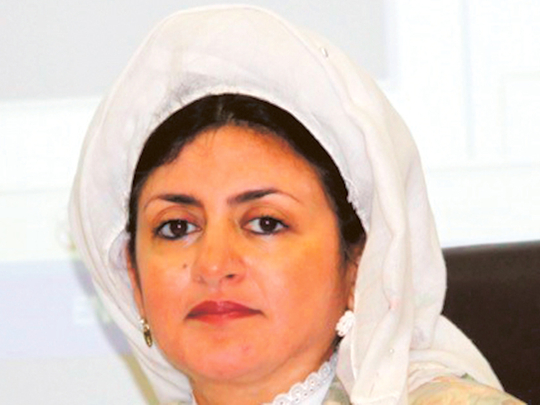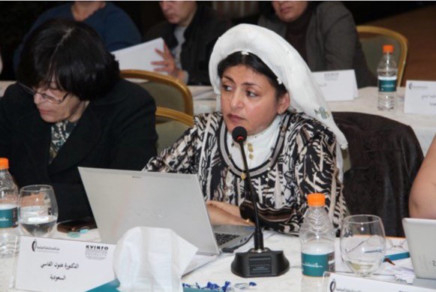
Jeddah: Earlier this month, Qatar University administrators forced Dr Hatoon Al Fassi, a leading Saudi scholar instrumental in helping women gain the vote in Saudi Arabia, to postpone a Debate Club discussion on women in Islam at the university where she teaches.
University students launched an online petition demanding her sacking, alleging that her views on women’s rights in Islam are “contrary to the Qatari culture and values” and she sought to “spread poison in students’ brains.”
Twitter users created the hashtag #I’mWiththeExpulsionofHattonAl-Fassi in their efforts to oust the professor. Critics claimed her teachings were against “Islamic Sharia,” although they provided no evidence.
Such is the lot of an Arab women’s rights activist: condemnation, threats, intimidation. And there is perhaps a no more sensitive topic in the Gulf region, especially in Saudi Arabia and Qatar, than the discussion of exactly what rights are accorded women in Islam.
The Qatar incident appears to have boiled over following an article written by two of Al Fassi’s students.
“The problem was they wrote an article and argued there were some laws and gaps in women’s rights in Qatar,” Al Fassi told the Gulf News. “It was done professionally based on evidence. It’s common knowledge. I endorsed them and tweeted how proud I was of them. The girls were attacked and then I was attacked [on social media].”
The irony is that if Al Fassi’s lecture were to be held in Saudi Arabia, a considerably more conservative country than Qatar, it would be unlikely to have raised eyebrows given her reputation as a respected scholar and an activist who works with a soft touch to raise awareness on women’s issues.
Al Fassi doesn’t court controversy, but she is also no stranger to it and does not shy away from a good fight. It was Al Fassi and her legion of followers who worked virtually non-stop since 2005 to help win women’s right to vote in municipal elections.
The first elections were held in December 2015 and saw 20 women win council seats throughout the kingdom. Nearly 1,000 women had registered as candidates and an estimated 132,000 women cast ballots for the first time.
Al Fassi said she keeps in touch with some of the elected council members and their success has had varying results. “I don’t think we expected to change the norms or a lot in the community,” she said.
Women members are hampered by council rules and still must contend with gender segregation, which makes performing their duties difficult.
In Jeddah, Rasha Hefzi has faced marginalisation from her male colleagues, but has battled on.
“She doesn’t submit to that and has kept on working by going into areas trying to meet with the people,” Al Fassi said.
Al Fassi noted that the Saudi government can say it has accomplished its commitment to human rights groups, noting that Saudi Arabia can write in its annual report that women have participation and can stand for elections. The box can be checked there, but the work ahead is to ensure that female participation is not just cosmetic, but actual engagement, she said.
Born in 1964, Al Fassi is a member of the Sufi Al Fassi family of Makkah and is a descendant of Qutbul Ujood Hazrat Muhammad Al Fassi, the spiritual leader of the Fassiyah branch of the Shadhiliyya Sufis. When she retired as associate professor of women’s history at King Saud University in Riyadh with a full pension, she accepted a post as visiting professor at Qatar University. A mother of two children, her husband is Dr Abdul Aziz Abu Hamad Aluwaisheg, the assistant secretary-general of the Gulf Cooperation Council.
Among Saudis she is instantly recognised for her traditional Hijazi-style hijab that honours the history and traditions of the Hijazi tribe and inspired by an aunt. Her parents, she once told a reporter, infused her with “the spirit of Islam, about what is the essence of being a Muslim woman.”
Her pride in her history and Hijazi tradition is evident in how she wields her influence in women’s rights.
While younger and more militant Saudi women have emerged using blunt language to advocate for their peers, Al Fassi uses a less confrontational approach that has garnered important allies. Her rhetoric is minimal and she relies on fact-based research to argue her point. It makes her popular among the more traditional and conservative Saudi women who view with skepticism aggressive activists who are often perceived as posturing with their attention-getting language usually spoken by Western activists.
But even gaining acceptance among Saudi women to accomplish her goals is a challenge. A vast cross-section of Saudi women claim no interest in voting or running for elected office, mainly because they perceive the council as having no relevance in their lives and their voice would not be effective.
“I see no advantage to being a member of a council or asking them for anything,” said one female Saudi academic who holds a doctorate. “If they can build a park that is not a safety hazard, fine, but that is like asking for the world.”
Al Fassi said she understands their position. Even the 30 seats on the Shura Council granted to women in 2013 does not change perceptions among some women.
“It’s very hard to see the result and the impact of women on the Shura Council and you really have to follow closely to see what is going on to have a real grasp of what they are doing,” she said. “And they don’t relate easily to the issues of what the municipal councils do. Women feel their opinions don’t count and it’s a cultural problem.”
Al Fassi points to the councils for failing to be more transparent, but also the Saudi media. She credits Saudi newspapers for their growth and maturity in journalism over the last decade, but problems persist. Journalists generally don’t cover specific beats, leading to a lack of expertise.
Saudi journalists cover issues in which they lack understanding, she said.
“It depends on the journalist,” she said. “You have progressive newspapers and you have people who mix things up. Somebody does an interview on a hot topic and then it’s published after the interference of the editor-in-chief and you have a very provocative title of just the opposite of what you are saying.”
However, she said there are more female journalists than 10 years ago. “There are a lot of new voices and new journalists who are doing a very good job.”
Al Fassi is less active in the #IAmMyOwnGuardian campaign, which seeks to eliminate male guardianship rules that require women to obtain permission to receive an education, marry, seek medical treatment or leave the country.
Yet she is vocal about its control over women and supports the movement by keeping in touch with its organisers.
Aziza Al Yousuf, a leader of the campaign, argues that guardianship applies to issues of marriage in which the husband serves as the breadwinner and protects his wife and nothing more.
But in her 2007 book, ‘Women in Pre-Islamic Arabia,’ Al Fassi goes further. She contends that Arabian women in the pre-Islamic Nabataean period had immense rights. The concept of male guardianship is rooted in Greek and Roman law and is neither Islamic nor Arabian.
Simply, contemporary clerics have misinterpreted the origins of Islamic law, she said.
“I dispute that marriage is a part of guardianship,” Al Fassi said.
“It’s not compulsory and when talking about a divorced woman, there is definitely no need for a guardian. As for compulsory consent from a minor [guardian], I oppose it. If a woman needs a guardian for a marriage, it’s only for support, but it’s not up to him [the guardian] to decide who she must marry.”
Meanwhile, cooler heads have prevailed over the Al Fassi’s discussion dust-up at Qatar University.
At the moment, the Debate Club event is on hold as university administrators seek a more “comprehensive” view on women in Islam “that takes into consideration its religious, social and academic aspects.”
— Rob Wagner is a freelance journalist based in Jeddah.













